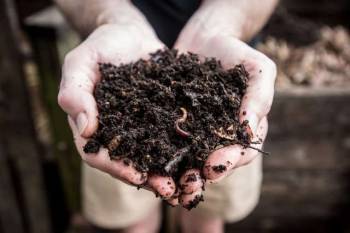NEW DELHI, 22 July 2024: For centuries, Indian farmers have nurtured their land with organic matter, intuitively understanding the importance of enriching the soil.
Today, this age-old practice is undergoing a renaissance driven by environmental concerns, resource scarcity, and a growing awareness of sustainable agriculture. Composting, the process of transforming organic waste into nutrient-rich fertilizer, is emerging as a powerful tool for a greener future.
Composting: A Boon for Soil Health
Chemical fertilizers have been the mainstay of modern agriculture, leading to short-term yield increases but often causing long-term damage. Excessive chemical use depletes soil of essential nutrients and microorganisms, hindering its ability to retain water and fight diseases. Composting offers a natural alternative, enriching the soil with organic matter that improves its structure, fertility, and water holding capacity. This fosters healthy plant growth and reduces dependence on chemical fertilizers, creating a virtuous cycle of sustainability.
Waste Not, Want Not: Turning Trash into Treasure
India generates a staggering amount of organic waste – food scraps, yard trimmings, and agricultural residues. This waste often ends up in landfills, releasing harmful methane gas into the atmosphere. Composting provides an elegant solution by converting this waste into a valuable resource. By diverting organic waste from landfills, composting reduces methane emissions and promotes a cleaner environment.
The Power of Community and Innovation
The rise of composting in India is fueled by a confluence of factors. At the grassroots level, communities are embracing composting as a way to manage their waste responsibly and improve their local environment. Organizations like the Indian Pollution Control Board (CPCB) and NGOs are promoting composting initiatives, providing training and resources to communities and individuals.
Innovation plays a crucial role in making composting accessible and efficient. Startups are developing innovative composting techniques and technologies like vermicomposting (using earthworms) and bio-composting (using microbial cultures) that can be adopted in urban spaces with limited land availability. Additionally, online platforms connect compost producers with home gardeners and urban farmers, creating a circular economy for waste management.
Benefits Beyond the Farm
The benefits of composting extend far beyond the agricultural sector. Composting reduces the need for landfill space, addressing a growing challenge in urban areas. It also promotes sanitation and hygiene by diverting organic waste from streets and garbage dumps. In urban environments, composting can be a great way to engage citizens in environmental issues and foster a sense of community responsibility.
Challenges and the Road Ahead
Despite its potential, composting in India faces several challenges. Lack of awareness and infrastructure are significant hurdles. Many people are unaware of the benefits of composting or lack the knowledge to do it effectively. Additionally, the absence of proper waste segregation systems in many areas makes it difficult to collect organic waste for composting.
To overcome these challenges, there is a need for multi-pronged approach. Educational campaigns and awareness programs can help people understand the importance and benefits of composting. Investments in infrastructure development, including composting facilities and waste segregation systems, are crucial for large-scale adoption.
Empowering the Future with Black Gold
Composting in India is no longer a niche practice but a vital step towards a more sustainable future. By harnessing the power of this "black gold," India can improve soil health, reduce reliance on chemical fertilizers, and manage waste responsibly. As awareness grows and innovations continue, composting has the potential to transform the agricultural landscape of India, contributing to food security, environmental sustainability, and a healthier tomorrow.
Citizen Action and the Power of Choice
The success of composting heavily relies on citizen participation. Here are some ways you can contribute:
- Start composting at home: Numerous resources and online tutorials are available to guide you through the process. Even small-scale composting makes a difference.
- Support composting initiatives: Look for composting programs in your community or support organizations working to promote composting.
- Segregate your waste: Proper waste segregation at home is the first step towards efficient composting.
- Spread the word: Talk to your friends, family, and neighbors about the benefits of composting.
- Choose compost-fed products: By supporting farmers who use compost, you indirectly contribute to a more sustainable food system.
By embracing composting, we can all play a vital role in creating a greener future for India.
Image credit: treehugger.com




















